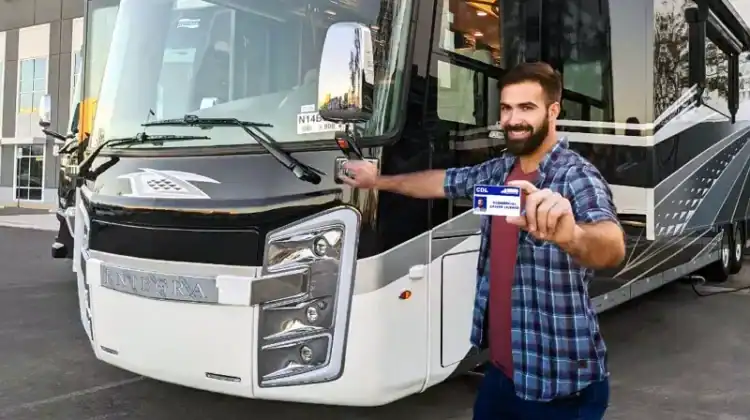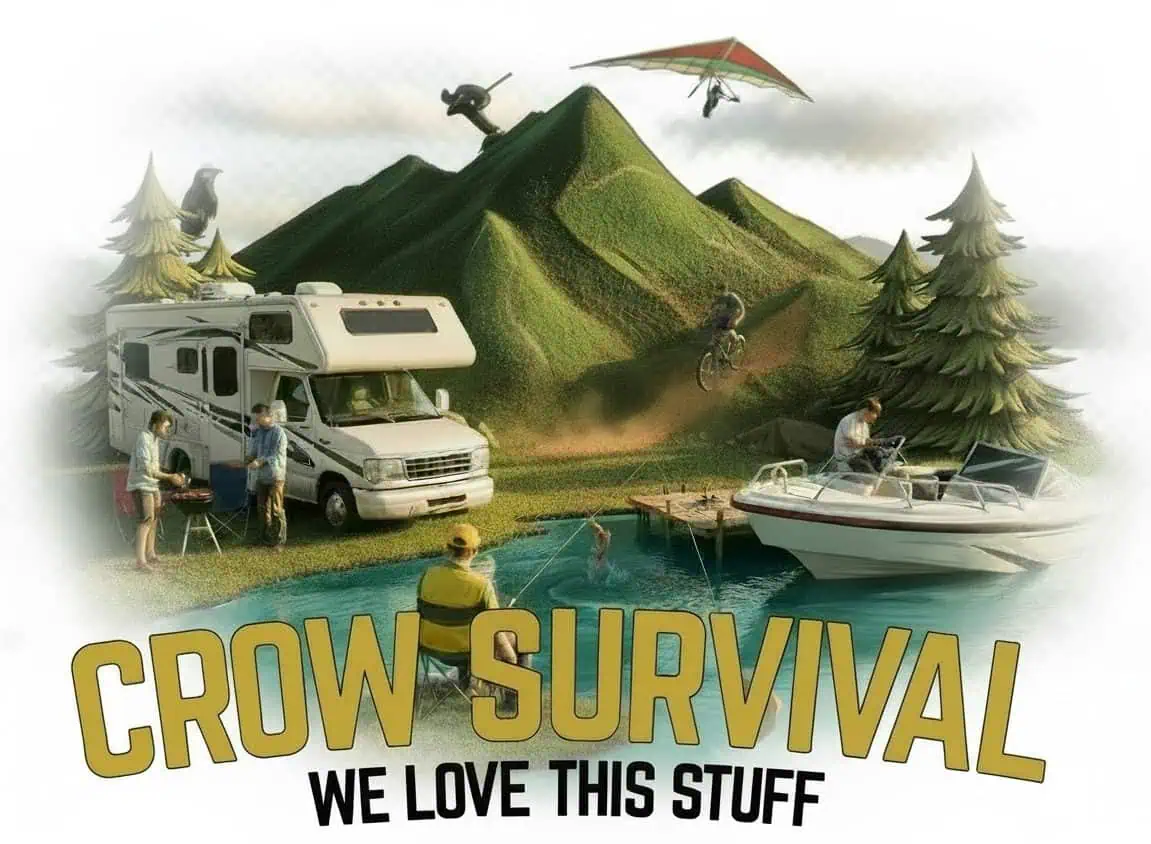
Thank you for reading our post, please rate this article at the end.
Reading Time: 7 minutesLast Updated on July 19, 2025 by Paul Clayton
Table of Contents
Do You Need a CDL to Rent an RV?
A Commercial Driver’s License (CDL) is typically required for vehicles under specific categories, such as heavy trucks, buses, and vehicles carrying hazardous materials.
Key Takeaways:
-
- CDL Generally NOT Required for RVs (Rental or Owned): In most of the United States and Canada, you do not need a Commercial Driver’s License (CDL) to drive an RV, whether it’s rented or owned. CDLs are primarily for commercial vehicles (heavy trucks, buses, hazardous materials carriers).
- State-Specific Exceptions Exist: A few U.S. states (e.g., Washington, D.C., Hawaii, and others, such as Connecticut) require a CDL for RVs exceeding specific weight limits (often over 26,000 pounds). It is crucial to check the particular DMV regulations of your home state and any states you plan to travel through.
- Special Non-Commercial Licenses: For very large RVs, even without a CDL, some states may require a non-commercial Class A license, especially for trailers with GVWR over 10,000 lbs or fifth wheels over 15,000 lbs.
- Renting an RV is Simpler: To rent most common RV classes (Class C, Class B, Truck Campers), you typically only need a valid standard driver’s license and a major credit card. Rental companies also often require drivers to be at least 21 years old and sign a rental agreement.
- RV Rental Booking Requirements: Beyond a driver’s license, booking an RV rental involves researching RV types, choosing a reputable rental company, providing a deposit, signing a rental agreement, ensuring adequate insurance, potentially outlining a basic travel plan, understanding all rental rates, and confirming roadside assistance is available.
- Driving RVs: Many RVs, even large ones, are surprisingly easy to drive, especially modern models with cameras. Class B motorhomes are considered the easiest to maneuver due to their compact size.
Can You Rent an RV for a Year?
A CDL is only needed in a few states to operate a motorhome. CDLs are only required for commercial vehicles, so you won’t need one unless you drive a motorhome for a living.
However, there are a few exceptions. Washington, DC, and Hawaii need a CDL for motorhomes weighing more than 26,000 pounds.
The criteria for an RV license differ significantly.
The RVs you’ll rent will be C, B, or Truck Camper. A valid driver’s license and a major credit card are required to operate a C Class RV.
Before the RV can be leased, all drivers must be at least 21 years old and sign a rental agreement.
There are several other RV license provisions to be aware of, including the type of RV you’re driving and the state you’ll visit.
Most states require one of two forms of special licenses: commercial or non-commercial. If you’re driving a car above a particular length or weight, you’ll need one of these licenses.
Certain CDL specifications may exist in some jurisdictions, but these requirements may not apply in others. When renting your dream RV, you only need one driver with a valid driver’s license and a big credit card.
These requirements will change yearly, so check with your state’s DMV to ensure you’re current on the new RV license requirements before heading out on the road.
When it comes to whether you need a CDL for an RV, the answer is typically no. In some states, you are required to have a CDL if you own a substantial Class A RV.

Do you need a CDL License to drive an RV?
Generally, a CDL, or Commercial Driver’s License, is used to operate commercial vehicles, such as city buses or large trucks. However, this special license may be necessary for driving an RV in some circumstances.
Specifically, eight states, including Connecticut and Hawaii, mandate the possession of a CDL for operating RVs that exceed certain weight limits.
If your RV falls under this weight category and you plan to drive in one of these states, obtaining a CDL license to drive an RV becomes a requisite.
It is recommended to check the specific regulations of each state you intend to travel through, as the laws can vary significantly. Ignorance of such requirements could lead to legal complications, so it is always better to be informed and prepared.
Do you need a Special License to rent an RV?
You do not require a special license or certification to drive a rental RV. If you are competent and confident in operating a standard automobile, you are deemed qualified to handle a rental RV.
However, it is imperative to note that possessing a valid and current motor vehicle license is a key prerequisite for renting and driving an RV.
This standard requirement is a testament to your ability to adhere to road rules and demonstrate safe driving practices.
Therefore, while a special license to rent an RV is not necessary, maintaining a valid motor vehicle license is non-negotiable.
What do you need to book an RV rental?

Research
The first thing you’ll need to do is do some research. Determine what type of RV suits your needs—size, amenities, and kind of driving are all important factors.
For example, a family of five may need a larger RV with kitchen facilities and separate sleeping areas, while a couple may be comfortable in a smaller, more compact model.
Rental Company
Choose a reputable RV rental company. Consider online reviews and ratings, ask friends or colleagues who have rented an RV before for recommendations, or use a reputable online booking site that aggregates listings from multiple rental companies.
Driver’s License
To rent an RV, you’ll need a valid driver’s license. Specific requirements vary by company and state, so check with the rental company for their unique stipulations.
Deposit
Most RV rental companies require a deposit to secure your booking. The deposit amount can vary, but it’s usually a percentage of the total rental cost.
Rental Agreement
You will need to sign a rental agreement. This outlines the terms and conditions of the rental, such as mileage limits, fuel policy, and the return process. It’s essential to read this carefully before you sign.
Insurance
It is crucial to have adequate insurance when renting an RV. This can be done either through your auto insurance provider or the rental company. It’s best to check beforehand to understand what is covered and what is not.
Travel Plan
Some RV rental companies require you to provide a basic travel plan or itinerary. This doesn’t always need to be detailed, but they may want to know where you plan to travel and how long you’ll be gone.
RV Rental Rates
Be sure to understand the total cost of the RV rental, including any additional fees and charges. This includes the base rental rate, additional mileage or amenity fees, taxes, and a potential cleaning fee.
Roadside Assistance
Verify if the rental company provides roadside assistance in the event of a breakdown. This can be a lifesaver, especially if you’re planning to travel in remote areas.
FAQs

Does a Class A RV require a CDL?
Very few states require you to have a CDL to operate a motorhome. CDLs are intended for vehicles with commercial use, so unless you drive a motorhome for a living, you probably don’t need a CDL.
There are, however, a few exceptions. For motorhomes over 26,000 lb., Washington, DC, and Hawaii require you to have a CDL.
How big of an RV can I drive without a CDL?
While the Commercial Driver’s License (CDL) manual states that a CDL is necessary for trucks weighing over 6,500 lb, this does not apply to Recreational Vehicles (RVs).
We have confirmed that the CDL requirement does not extend to any RV, regardless of its size. However, it’s essential to note that specific licenses are required for certain types of RVs.
For instance, trailers with a Gross Vehicle Weight Rating (GVWR) exceeding 10,000 pounds and fifth wheels with a GVWR exceeding 15,000 pounds require a non-commercial Class A license.
For more details on the licensing requirements for various types of RVs, refer to the Recreational Vehicles and Trailers Handbook.
Thus, even without a CDL, you can drive a considerably large RV provided you have the appropriate non-commercial license.
What size motorhome can you drive in Australia with a car license?
We’re often asked if a special driver’s license is required when considering campervan or motorhome hire in Australia.
This means that if you are hiring one of our larger four- or six-berth motorhomes with a cabover, you do not need a special driver’s license – your regular car license will be sufficient.
Do you need a CDL to transport RVs?
Typically, a CDL is required for transporting motorhomes or RV trailers. You will be running under transporter tags and will be considered the same as over-the-road trucks when it comes to paperwork and permits.
How hard is it to drive a Class A RV?
Motorhomes, as I mentioned before, are generally surprisingly easy to drive.
They’re not too tricky to navigate, and modern motorhomes often come equipped with cameras all around that give you a good view of your surroundings. If a motorhome is exceptionally long, however, turns can be difficult.
What type of RV is the easiest to drive?
Class B Motorhomes. The tradeoff for snug living quarters is drivability. Because of their compact size, Class B RVs are some of the easiest RVs to drive. And there’s no need to tow an extra vehicle behind, as these RVs are perfect for day trips and excursions.
Final Thoughts
A Commercial Driver’s License (CDL) is generally not required for most RV rentals. The need for a CDL typically applies to vehicles that weigh over 26,001 pounds, which is not the case for most recreational vehicles.
However, rules and regulations can vary by state and the size of the RV. For instance, specialty and commercial vehicles may be exceptions to this rule.
Moreover, a non-commercial license may be required for renting long motorhomes in states like California. Therefore, checking specific state laws for detailed requirements is crucial before renting an RV.
Despite the absence of a CDL requirement, driving an RV does require proper training due to its larger size and different handling characteristics compared to regular cars.
Most rental companies understand this and offer an orientation to familiarize renters with RV operations, ensuring a safe and enjoyable trip.
Home page
Back to the top of the page







